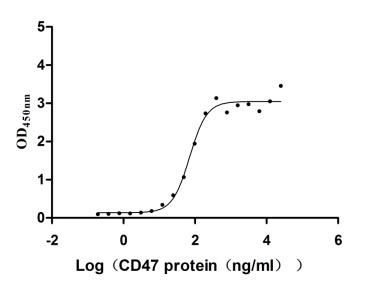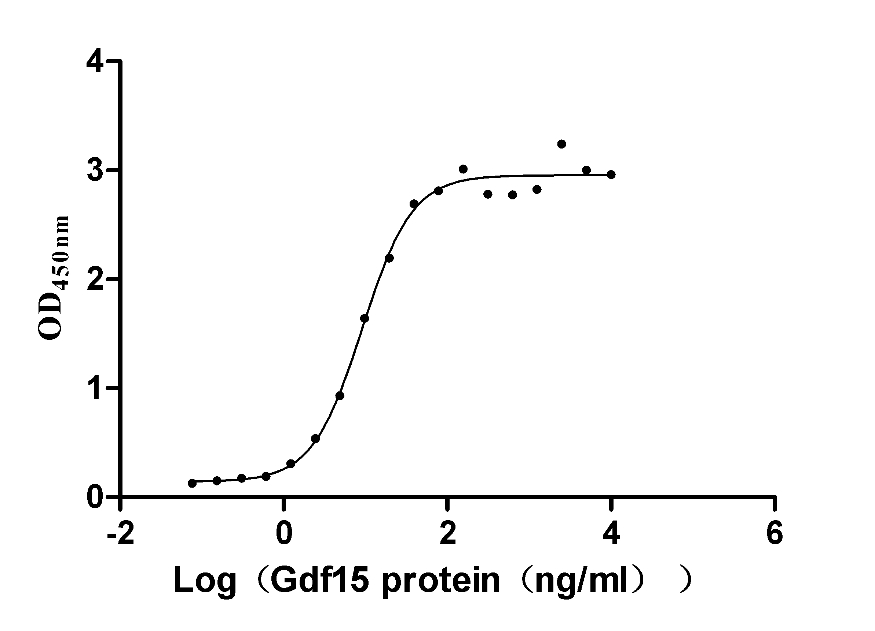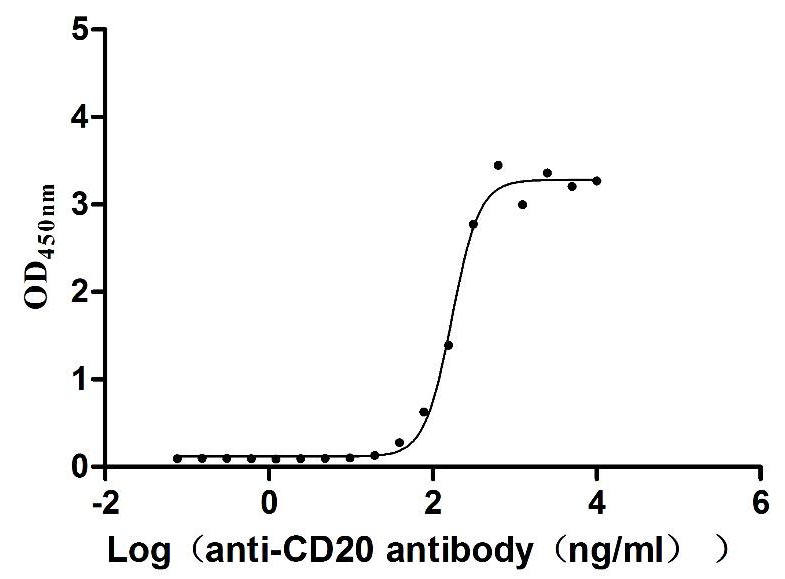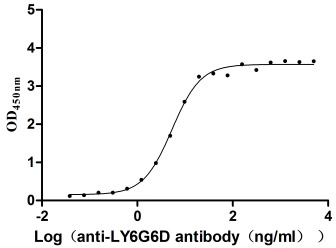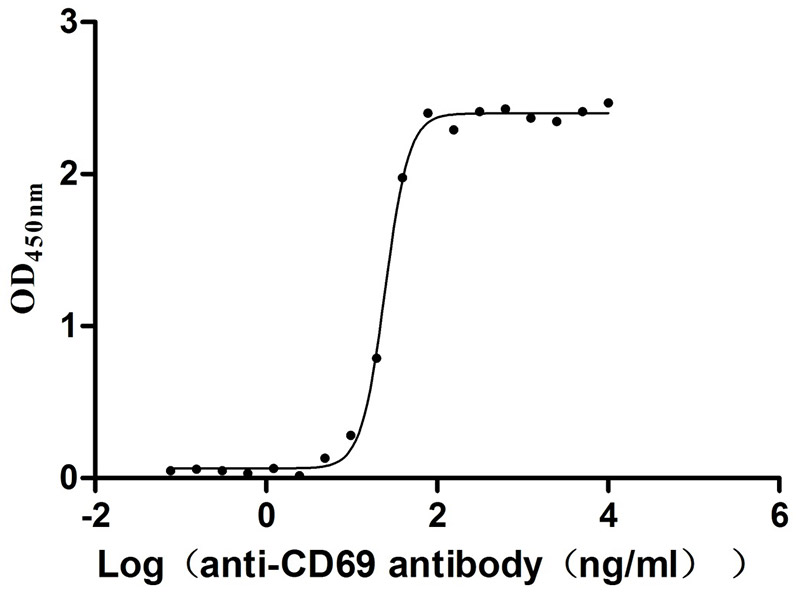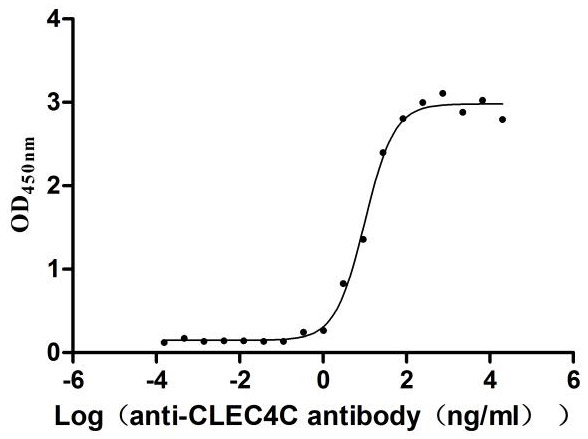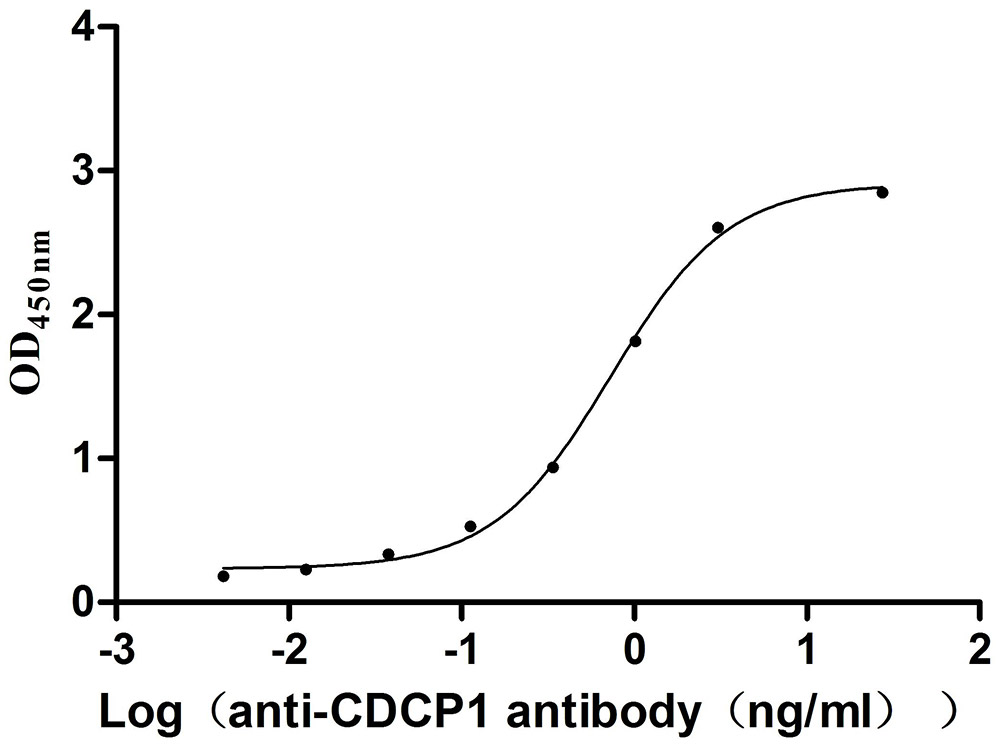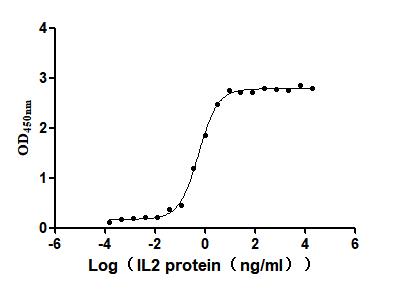Recombinant Human Lens fiber major intrinsic protein (MIP), partial
-
货号:CSB-YP013834HU1
-
规格:
-
来源:Yeast
-
其他:
-
货号:CSB-EP013834HU1
-
规格:
-
来源:E.coli
-
其他:
-
货号:CSB-EP013834HU1-B
-
规格:
-
来源:E.coli
-
共轭:Avi-tag Biotinylated
E. coli biotin ligase (BirA) is highly specific in covalently attaching biotin to the 15 amino acid AviTag peptide. This recombinant protein was biotinylated in vivo by AviTag-BirA technology, which method is BriA catalyzes amide linkage between the biotin and the specific lysine of the AviTag.
-
其他:
-
货号:CSB-BP013834HU1
-
规格:
-
来源:Baculovirus
-
其他:
-
货号:CSB-MP013834HU1
-
规格:
-
来源:Mammalian cell
-
其他:
产品详情
-
纯度:>85% (SDS-PAGE)
-
基因名:MIP
-
Uniprot No.:
-
别名:MIP; AQP0; Lens fiber major intrinsic protein; Aquaporin-0; MIP26; MP26
-
种属:Homo sapiens (Human)
-
蛋白长度:Partial
-
蛋白标签:Tag type will be determined during the manufacturing process.
The tag type will be determined during production process. If you have specified tag type, please tell us and we will develop the specified tag preferentially. -
产品提供形式:Lyophilized powder
Note: We will preferentially ship the format that we have in stock, however, if you have any special requirement for the format, please remark your requirement when placing the order, we will prepare according to your demand. -
复溶:We recommend that this vial be briefly centrifuged prior to opening to bring the contents to the bottom. Please reconstitute protein in deionized sterile water to a concentration of 0.1-1.0 mg/mL.We recommend to add 5-50% of glycerol (final concentration) and aliquot for long-term storage at -20℃/-80℃. Our default final concentration of glycerol is 50%. Customers could use it as reference.
-
储存条件:Store at -20°C/-80°C upon receipt, aliquoting is necessary for mutiple use. Avoid repeated freeze-thaw cycles.
-
保质期:The shelf life is related to many factors, storage state, buffer ingredients, storage temperature and the stability of the protein itself.
Generally, the shelf life of liquid form is 6 months at -20°C/-80°C. The shelf life of lyophilized form is 12 months at -20°C/-80°C. -
货期:Delivery time may differ from different purchasing way or location, please kindly consult your local distributors for specific delivery time.Note: All of our proteins are default shipped with normal blue ice packs, if you request to ship with dry ice, please communicate with us in advance and extra fees will be charged.
-
注意事项:Repeated freezing and thawing is not recommended. Store working aliquots at 4°C for up to one week.
-
Datasheet :Please contact us to get it.
相关产品
靶点详情
-
功能:Water channel. Channel activity is down-regulated by CALM when cytoplasmic Ca(2+) levels are increased. May be responsible for regulating the osmolarity of the lens. Interactions between homotetramers from adjoining membranes may stabilize cell junctions in the eye lens core. Plays a role in cell-to-cell adhesion and facilitates gap junction coupling.
-
基因功能参考文献:
- Study presented genetic and functional evidence for a novel major intrinsic protein mutation of G212R, which leads to congenital progressive cortical punctate with or without Y suture. PMID: 28059152
- In summary, whole-exome sequencing identifies a novel heterozygous missense variant (c.402G > T) in rarely reported cataract gene of MIP in an unconsanguineous marriage of three-generation Chinese family with congenital cataracts. PMID: 28836894
- The data evidence a broad lipidation profile of AQP0 that is both species and site independent, suggesting a chemical-based ester aminolysis mechanism to explain such modifications. PMID: 27378310
- A novel MIP frame-shift mutation in familial congenital nuclear cataract patient PMID: 27456987
- defects in AQP-0 permeability may be a cause for presbyopia. PMID: 26615967
- the p.D150H mutation is a novel disease-causing mutation in MIP, which leads to congenital progressive cortical punctate cataract by impairing the trafficking mechanism of AQP0. PMID: 25946197
- s identified a novel nonsense mutation in MIP (c.657 C>G; p.Y219*) (major intrinsic protein gene) that segregates with congenital posterior polar cataract in a Chinese family. PMID: 25803033
- Functional evidence linking the new MIP mutation of G215D to autosomal dominant congenital cataracts. PMID: 25033405
- A novel donor splice-site mutation (c.606+1G>A) in the MIP gene causes congenital cataract in a Chinese family. PMID: 24319327
- the first nonsense mutation of MIP identified in autosomal dominant congenital cataracts PMID: 24405844
- Mutation of this conserved glycine residue leads to improper trafficking of AQP0-G165D and loss of water channel function. PMID: 23116563
- Aquaporin 0 R233K mutation did not affect the expression, location and trafficking of the protein but did influence the interaction between AQP0 and CaM. PMID: 22662182
- Direct tissue analysis led to the detection of aging-related AQP0 modifications including carbamylation, acetylation, and oleoylation. PMID: 22036630
- Major intrinsic protein (MIP) polymorphism is associated with age-related cataract in Chinese. PMID: 21921980
- Cerulean cataract has been mapped to chromosome 12q13 and associated with a novel initiation codon mutation in MIP. PMID: 21850180
- A novel mutation in the MIP gene is associated with autosomal dominant congenital nuclear cataract in a Chinese family. PMID: 21647270
- analysis of a novel disease-causing mutation p.R187C in MIP in a Chinese cataract family PMID: 21245956
- AQP-0 gene expression was 3.4-fold higher in rat retinas. AQP-0 was predominantly expressed in the bipolar cells of the non-diabetic rat retinas, whereas it was also expressed in the retinal nerve fibers of diabetic rat retinas PMID: 21232536
- This is the first report of activation of a cryptic splice site in the 3' UTR in the human MIP gene. PMID: 21139677
- This study has identified a novel MIP mutation, p.V107I in a Chinese family with congenital cataracts. PMID: 20361015
- In human, multiple aquaporins are expressed in developing teeth and in selected orofacial tissues. PMID: 12522663
- Analysis of C-terminal peptides of AQP0 from normal lenses of donors aged 34 to 38 reveals a remarkably similar pattern and distribution of truncation products, suggesting specific temporal mechanisms for post-translational modification of AQP0. PMID: 15274640
- Expression of hMafF or MIP alone did not alter basal reporter transcription activity, whereas co-expression of hMafF and MIP activated transcription efficiently. PMID: 16549056
- We identified a novel single base pair deletion in the MIP gene and conclude that it is a pathogenic sequence alteration. PMID: 16564824
- First dominant cataract mutation in MIP that is located outside the phylogenetically conserved transmembrane domain. PMID: 17893667
- The structure of aquaporin-0 (AQP0) has recently been determined by electron crystallography of two-dimensional crystals and by X-ray crystallography of three-dimensional crystals--REVIEW PMID: 17932686
- Arginine in this domain plays a crucial role in the function of the carboxyl-end of this protein and provides a helpful clue to further studies on completely understanding the physiological significance of MIP and its role in the formation of cataract. PMID: 17960133
- presence of measurable interactions between MIP26 and all crystallins, with the extent of interactions decreasing from alphaA- and alphaB-crystallin to betaB2- and gammaC-crystallin. PMID: 18004741
- To map the disease locus for a congenital cataract family, and detect the disease-causing gene. PMID: 18247294
- deletion mutation in AQP0 resulted in the localization of the mutant protein in the ER without trafficking to the plasma membrane, and cytotoxicity due to the accumulation of the mutant protein PMID: 18501347
- This is the first report on an acceptor splice-site mutation in human genes associated with dominant congenital cataract. PMID: 19137077
- Only in the presence of both MIP and hMafF could the nUS2-pLacZi reporter in yeast genome be activated. PMID: 19723544
- this is the first report validating the possible structural role of intact AQP0 as a cell-to-cell adhesion protein, using an in vitro expression system. PMID: 19857466
显示更多
收起更多
-
相关疾病:Cataract 15, multiple types (CTRCT15)
-
亚细胞定位:Cell membrane; Multi-pass membrane protein. Cell junction, gap junction.
-
蛋白家族:MIP/aquaporin (TC 1.A.8) family
-
组织特异性:Expressed in the cortex and nucleus of the retina lens (at protein level). Major component of lens fiber gap junctions.
-
数据库链接:
HGNC: 7103
OMIM: 154050
KEGG: hsa:4284
STRING: 9606.ENSP00000257979
UniGene: Hs.574026
Most popular with customers
-
Express system: Mammalian cell
Species: Homo sapiens (Human)
-
Recombinant Mouse GDNF family receptor alpha-like (Gfral), partial (Active)
Express system: Mammalian cell
Species: Mus musculus (Mouse)
-
Recombinant Dog B-lymphocyte antigen CD20 (MS4A1)-VLPs (Active)
Express system: Mammalian cell
Species: Canis lupus familiaris (Dog) (Canis familiaris)
-
Recombinant Macaca fascicularis lymphocyte antigen 6 family member G6D (LY6G6D) (Active)
Express system: Yeast
Species: Macaca fascicularis (Crab-eating macaque) (Cynomolgus monkey)
-
Recombinant Human Early activation antigen CD69 (CD69), partial (Active)
Express system: Mammalian cell
Species: Homo sapiens (Human)
-
Recombinant Human C-type lectin domain family 4 member C (CLEC4C), partial (Active)
Express system: Mammalian cell
Species: Homo sapiens (Human)
-
Recombinant Mouse CUB domain-containing protein 1 (Cdcp1), partial (Active)
Express system: Mammalian cell
Species: Mus musculus (Mouse)
-
Recombinant Human Interleukin-2 (IL2) (Active)
Express system: Mammalian cell
Species: Homo sapiens (Human)


